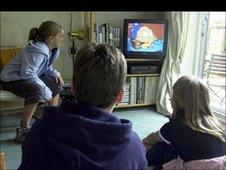Viewers suggest TV watershed changes in Ofcom survey
- Published

The findings reinforced earlier studies into offensive language on TV
Some television viewers believe the watershed should be moved to 11pm at weekends, according to a survey for media watchdog Ofcom.
In a report looking at offensive language, participants said children stayed up later at weekends and were "more likely" to hear bad language.
Some thought extending the watershed to 10pm or 11pm would be a solution.
But Ofcom said it was not planning to make any policy changes as a result of the report.
The survey provided an indication of changing attitudes to language since Ofcom's last study in 2005.
Since then, the report said, Ofcom had "received complaints about... terms which may not have previously been considered potentially offensive.
"In addition some words are now considered of heightened sensitivity."
Most offensive words
For the study, clips from various shows - including comedies, cartoons and reality series - were played to participants, who were asked to rate whether they found the material offensive.
Their responses reinforced earlier findings on the words and phrases viewers find most offensive.
Most agreed that words like "arse", "breasts" and "damn" were acceptable at any time of the day.
The impact of the "most offensive" words - which are unprintable here - remained undiminished.
Most participants said the acceptability of the language "depended on whether the show was targeting children, families or adults".
Strong language was therefore more "acceptable" in factual or adult programming, which children were unlikely to choose.
Many who were asked said they thought broadcasters needed to make "greater efforts to raise awareness of potentially offensive language in newer programmes, where the audience can have no knowledge on which to base their expectations".
Viewers also made a distinction between channels. Content that would be offensive on the BBC had less impact on E4, for example.
Ofcom's research was qualitative - meaning it did not involve a statistically relevant sample of the UK population, but aimed to provide regulators with "a contextualised consideration of views of different offensive terms".
- Published2 June 2010
- Published1 June 2010
- Published28 May 2010
- Published27 May 2010